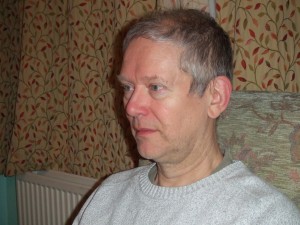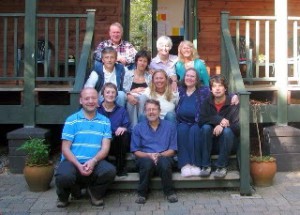The Focuser’s Focus, Vol.18, No.1, Winter Issue 2015
Focusing in the United Kingdom
By Rob Foxcroft
(Certifying Coordinator, UK)
I began to learn focusing and experiential listening in the summer of 1987, when I was tentatively emerging from a very difficult period in my life. In March 1988, I made the first of several brief visits to Chicago to study with Gene Gendlin, Mary McGuire, Bebe Simon and their colleagues. Soon afterwards, I got in touch with a number of people in Britain who were already teaching focusing. Peter Afford, Barbara McGavin and I met for tea in the city of Bath one wet autumnal afternoon. It was a memorable encounter, as we began to sound one another out (that process, at least, still continues).
In many countries, focusing has come through the universities. This was not so with us. We were all individual practitioners in private practice. We had come from many backgrounds. Our understandings and approaches were naturally varied. Some of us were psychotherapists, some not. Some had had person-centred training, some not. No two had the same perspective. No two had been trained by the same teachers. We found we must take our time. The process would not be hurried.
For it was not at first easy to see whether we would be able to come into enough unity to work together and support one another’s teaching. We seemed so far apart. Yet we learned to value diversity of practice. We came to see diversity as central to the focusing approach. We were protective of our own ways and we came to respect the ways of others. After all, if we were not going to trust each individual’s felt sense, what would we be doing in focusing anyway?
We had many further meetings and conversations – an icy weekend amongst the mountains of the Lake District, a couple of sunny meetings in busy London, several peaceful gatherings in the countryside. During one such gathering, I spent more than twenty-four hours waiting in a frozen train, whilst heavy snows fell outside and gallant colleagues daringly attempted a rescue by road. In the end we did what we had set out to do, when the British Focusing Association was set up in 1994.
Today our members include practitioners, who work one-to-one, offering focusing sessions and individual teaching; teachers, who are also qualified to teach groups and to offer a ten-day training in focusing and listening; and mentors, who are also qualified to train practitioners and teachers. Some of us are specialised focusing teachers, some are focusing-oriented psychotherapists or life-coaches, and some bring focusing into other areas, such as yoga, art, music and creative writing.
Focusing is deeply woven into our daily lives. We have seen the subtle and profound ways in which focusing informs our actions and relationships. We are thankful for the quiet, reliable developments in our inner lives. We long for a world in which focusing is as well known and widely practised as prayer or meditation. We have found it possible to balance stubborn independence with friendly co-operation, in a way that supports our work and slowly builds a presence for focusing in British society.
We want the British Focusing Association to embody our deeply-held values, so that all our interactions will be respectful and focusing-oriented. We want to combine very high levels of openness, acceptance and mutual respect with equally high standards of focusing teaching and practice. We work together all the time to find and maintain a balance between individual creativity and professional integrity.
After much focusing and discussion, we decided to uphold a set of seven core values, and we agreed on the following wording as a clear expression of those values.
- Mutual respect.We believe that each person brings something of value to our endeavours. Each member’s voice has equal validity – and everybody is encouraged to share his or her viewpoint.
- Integrity.We are committed to high standards of personal and professional integrity.
- Diversity.We honour the creativity and diverse styles of each of our members. Because this is so important to us, our teachers are free to design their own programmes and develop their own teaching styles.
- Openness.We are open to what each person can contribute to our knowledge and understanding of focusing and how it can be shared with others. We are open to including recognised practitioners from each of the approaches to practising and teaching focusing.
- Support.Working alone can be a lonely business. We encourage our members to have partnerships where they can exchange support for their work.
- Sensitivity to each person’s needs.Each person is an individual with his or her own needs. We are committed to being sensitive to the individual needs of each of our members, students and clients.
- Consensus.We are committed to taking into account each person’s feelings of acceptance or disquiet. For this reason we do not vote. We make decisions by listening carefully until all those present agree to go forward.
This last value, our principle of consensus, changes everything. Any time people vote, somebody’s felt sense is overridden. But when you know that the group will not go on without you, something in you becomes peaceful and secure. You are no longer driven to be tense and rigid, in the fear of being unheard or disregarded.
And when the group knows that it is not going to vote, but to wait until a common way emerges, people remember to listen to the person whose felt sense is uneasy, even though action feels pressing. While consensus seems slow, it is secretly fast, because nobody is left behind.
One of the effects of this way of coming to a decision is that we have to spend a lot of time coming to know and trust one another; and then, perhaps surprisingly, we find that we often make decisions very quickly and efficiently. One way we sometimes use to decide something is to say to two or three people: “Do something sensible. We trust you.” This may be the best decision of all.
By putting the human aspect before the executive, in the way I have just spoken of, we have slowly built a real community of practitioners; one that feels very strong and loyal, one in which all are equal and all our voices are heard.
For many years we were an unincorporated association, simply a gathering of friends and colleagues, with no legal status or protections. Recently we became a Community Interest Company: a legal structure which gives our members security from debt in the event of financial losses. This enabled us to organise our second Focusing School a few weeks ago, a most successful gathering of focusers from as far away as Israel; and it will make it possible host the International Focusing Conference in 2016.
The conference will be held in Robinson College, Cambridge, an easy walk from the river and the ancient colleges. We hope that it will be a deeply memorable occasion, and that many of our Japanese friends will come to be with us.
There are a number of excellent focusing teachers in Britain who are not part of our association. We are (I believe) on good terms with all of them. There is fine work going on at the University of East Anglia, at Regent College and Regent’s University in London, and through the Institute for Biospiritual Research. I am not the best person to say more about these other strands; but I hope that this account will give our friends and colleagues in Japan some sense of the distinctive flavour and contribution of the British Focusing Association.

